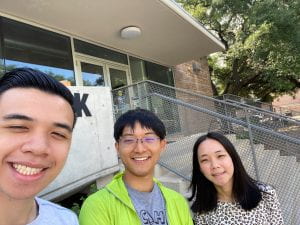Hello! Throughout the next few weeks, I will be posting updates about my experiences working at the Oshman Design Engineering Kitchen (ODEK) at Rice University in Houston, TX as part of the Rice 360 Global Health Technologies Summer Internship. I am excited about diving deep into the engineering design process and begin developing a solution to a global health issue!
Before getting into the details of my first week, I would like to tell you about myself and the experiences that have led me to become a Rice 360 intern. My name is Lam Nguyen, and I was born and raised in Houston, and I’m a rising junior at Lovett College. I am also a pre-med student working towards a B.S. in Chemistry and a minor in Global Health Technologies. In terms of extracurriculars, I am a tutor for Rice PAIR, a Houston Methodist Patient Service volunteer, an undergraduate researcher in the chemistry department, and a peer academic advisor.
My passion for global health stems from my past experiences volunteering for a Mexican non-profit that is dedicated to providing shelter and basic resources for low-income families who are seeking pediatric cancer treatment nearby. Interacting with these families and learning about the inequities that prevented them to access quality healthcare opened my eyes to how interwoven medicine and social justice are. Global health has provided me with an opportunity to explore these health-care related issues through a more interdisciplinary perspective. Furthermore, taking the GLHT 201 course here at Rice opened my eyes to how technology can be the answer to some of the most pressing global health issues. I see this internship as a great way to gain greater insight into the design process and what global health collaboration actually looks like.
This summer, I will be collaborating with fellow interns Andrew Sun and Gloria Ni in partnership with our wonderful client Mr. Prince Mtenthaonga, a nurse at the Queen Elizabeth Central Hospital in Malawi. Our team name is NIMBS – Neonatal Instructional Model for Ballard Scoring. We will be closely working with Prince in order to build a training model that will aid nurses in learning how to properly perform the New Ballard Assessment in order to assess the gestational age of a newborn. For context, prematurity is one of the leading causes of newborn deaths, especially in under-developed regions, and it is estimated that about 80% of newborn deaths can be prevented by improving access to quality care at the time of birth. As a result, it is important to know a newborn’s gestational age in order to determine the necessary treatment. While ultrasound technology and a woman’s menstrual cycle are commonly used to determine gestational age, financial burdens and inconsistencies in record-keeping make these two options unreliable ways of determining gestational age. The New Ballard Score, a series of neuromuscular and physical examinations, provides a reliable alternative. Unfortunately, many nurses lack the necessary knowledge to perform the assessment, and the ongoing nursing shortage in Malawi makes it difficult to properly carry out the examinations. This creates a need for a training model that can help them practice implementing the Ballard Assessment. We hope to utilize a previous design team’s needs-finding research and the expertise of our client to satisfy this need.
This week, we worked on understanding the problem context, researching the Ballard Assessment, learning about newborn health, and familiarizing ourselves with how nurses are trained and the factors contributing to the nursing shortage. We met with a member of the previous design team that tackled this project in order to understand the challenges that they encountered, and we also met with Prince in order to clarify the problem and gain better insight into the parameters of our project.
We already have a rough idea of what our model is going to look like, and we will be working on developing robust design criteria during week 2. We also are planning to contact nurses working in Malawi in order to gain a greater insight into the specific challenges they face working with newborns and utilizing the Ballard Assessment. Our team has already gotten to know each other very well, and I am looking forward to providing updates regarding the progress of our design and my overall growth throughout this summer! 🙂
-Lam Nguyen
Team photo
